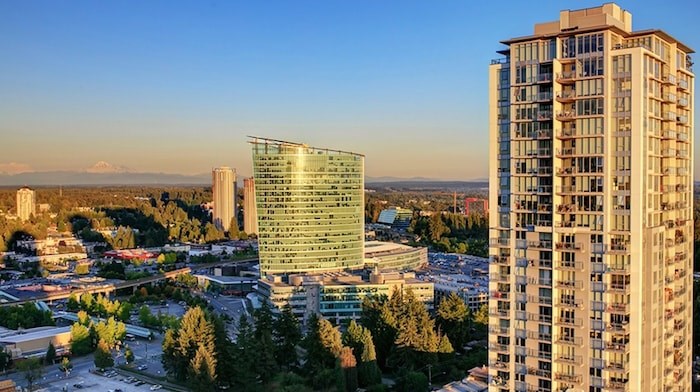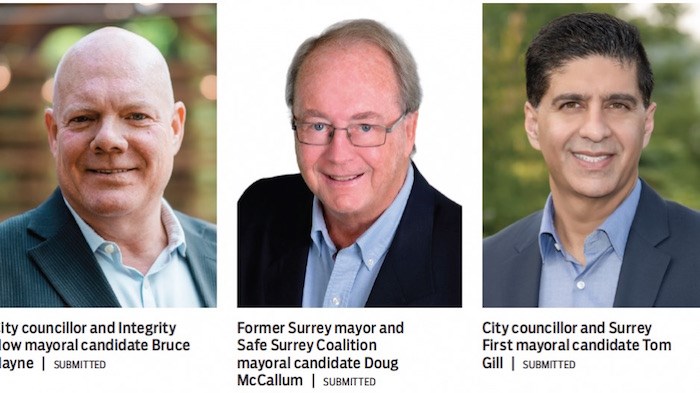Two key questions have come to shape what could be a defining moment in Surrey’s history: whether the city’s next mayor and council will support TransLink’s 10-year investment plan, and whether it’s time for the city to have its own police force.
“This is shaping up to be a very interesting election,” Elizabeth Model, CEO of the Downtown Surrey Business Improvement Association, told Business in Vancouver.
 Six of the top 10 cities are in the Lower Mainland, according to annual rankings (REW.ca)
Six of the top 10 cities are in the Lower Mainland, according to annual rankings (REW.ca)
“I think everyone is starting to realize that Surrey is a real powerhouse in the region, and the next mayor and council will provide vision to shape the future of the growth of the city,” Model said.
Surrey’s mayoral race has in part been defined by transportation concerns, and whether candidates will support the $1.65 billion light-rail transit (LRT) line slated to connect Surrey’s downtown core with its town centres in Newton and Guildford.
Some, including city councillor Bruce Hayne and former Surrey mayor Doug McCallum, have argued that SkyTrain service would better suit the needs of the fastest-growing city in the province.
“The studies that TransLink has done, their own studies that have been conducted and the business case they looked at doing, simply doesn’t support LRT,” said Hayne, who was first elected to council under the Surrey First banner in 2011 and is running for mayor with Integrity Now.
“We owe it not only to ourselves but to the region, then, to get included in the rapid transit network and infrastructure that’s already in place in Metro Vancouver, which is SkyTrain.”

McCallum, who ran for mayor in 2014, has changed his position on the issue. Four years ago, he told Business in Vancouver that light rail was “the only way to go” for a city with large swaths of agricultural land.
“I would even go on a limb and say it’s 100% of cities Surrey’s size – both population and geography – all have light rail. And it works unbelievably well,” he said at the time.
This election, the Safe Surrey Coalition candidate is calling out Surrey First for not having listened to the people and has vowed, if elected, to cancel LRT in his first council meeting and begin planning for SkyTrain.
Coun. Tom Gill – tapped by Surrey First to run for mayor after Mayor Linda Hepner announced she would not seek re-election – has defended LRT in Surrey, a project that has been approved by the Mayors’ Council on Regional Transportation, is part of TransLink’s $7.3 billion second-phase investment strategy, and is earmarked for provincial and federal government funding.
“We had finalized a business plan in 2008, and we spent 10 years looking for funding on it, so that’s the reality that we’re faced with,” said Gill, who pointed to Surrey’s geography as a key reason why the city needs the plan.
“In the next 30 years, we’re looking at 150 kilometres of LRT to service this community, to connect six town centres,” he added. “This system will be bigger than SkyTrain.”
It’s unclear how far one municipality could get if it wanted to change an approved, regional plan. However, approximately half of Mayors’ Council representatives will not be seeking another term, and support from other communities isn’t necessarily out of the question. Vancouver’s top mayoral contenders, for example, have all voiced varying degrees of support for extending the plan’s Broadway corridor rapid transit line all the way to the University of British Columbia.
“If that is the will and wish of all of these mayors, to go back to the drawing table, to hold the pause button, then we’re going to be a culture in Metro Vancouver reliant on cars,” said Anita Huberman, CEO of the Surrey Board of Trade. “We’re going to be another Los Angeles, because how else are you going to get around?
“Our concern is that it’s taken so long to make these investment decisions, to get all levels of government at the same table, to commit to funds.”
Model echoed that sentiment: “If we don’t grab that funding now that’s on the table, ... Surrey’s going to lose, and we’re going to lose big time.”
Peter Hall, professor with Simon Fraser University’s urban studies program, added that “this potentially could set back by a decade an agreed plan that the Mayors’ Council stuck with through the referendum, and for which there is senior government funding support.
“If I understand the candidate positions correctly, Surrey is the greatest risk, but Vancouver might be a problem too depending on the outcome there. SkyTrain to Langley is not a community-building strategy for Surrey. The whole point of LRT is that it strengthens three nodes within Surrey, in particular Central City. The age-old transportation geography principle that activity takes place at points where there is a change of mode still applies.”
Crime and public safety have for years been an election priority for Surrey residents and businesses alike. This time, the issue has spurred a debate about whether the city is ready for its own police force.
Surrey First has committed to a review of police services within its first 100 days in office, along with a $50 million plan focused on prevention, intervention and enforcement. Hayne favours supporting the existing force, rather than moving to a new model. He has promised to hire 40 new RCMP officers per year over the next four years.
“That discussion is not a simple ‘turn the light switch on or off,’” he said. “If the decision is to move at some point to a municipal policing model, it would take many years to get there.”
McCallum said public safety is why he decided to run.
“In our first council meeting we are going to withdraw from the RCMP, we’re going to form our own Surrey police force,” he said.
While many crime statistics have trended lower over the past several years – including business breaking and entering, theft and theft from vehicles – Huberman said there remains the perception in Surrey that there is a high crime rate.
“We’re trying to make sure that this is a leading-edge, innovative city with great industry hubs, which no one is really focusing on,” she said. “The whole public safety element is quite high on people’s radar, even in this election as it was in the last election.”
Surrey has eight candidates for mayor and 48 candidates vying for eight councillor positions.
After transportation and public safety, Model and Huberman said permitting issues, delays at city hall and a high level of city staff turnover are among top concerns for Surrey’s business community.
“It’s not all been good,” Model said, adding that acquiring and retaining human capital has been a “huge” issue for local businesses. “The other thing is, what is the municipality doing within their mandate? What do they have available, to ensure affordability for everyone?”



